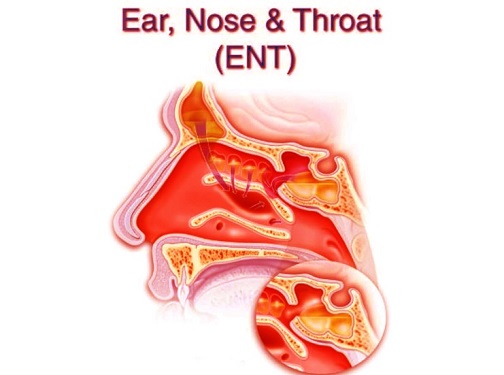Nikhil Prasad Fact checked by:Thailand Medical News Team Jan 15, 2025 3 months, 1 week, 2 days, 16 hours, 26 minutes ago
Medical News: A Global Perspective on Lingering Health Challenges
The COVID-19 pandemic, caused by the SARS-CoV-2 virus, has left behind a myriad of health challenges for individuals who have recovered from the acute phase of the disease. Among these challenges is the phenomenon of post-COVID or long COVID, where symptoms persist for extended periods, affecting multiple organ systems. This
Medical News report delves into the specific otorhinolaryngological (ENT) symptoms associated with post-COVID conditions, shedding light on recent research and findings.
 ENT-Related Manifestations in Long COVID
Understanding Long COVID
ENT-Related Manifestations in Long COVID
Understanding Long COVID
Long COVID refers to the array of health complaints that continue or re-emerge after the acute phase of a SARS-CoV-2 infection. These complaints are defined by their persistence beyond four weeks (long COVID) or 12 weeks (post-COVID syndrome) and cannot be explained by other medical conditions. According to a study by researchers from Jena University Hospital (Germany), Radboud University Medical Center (Netherlands), The University of Hong Kong, Emory University (USA), and several other institutions, post-COVID symptoms vary widely in their severity and duration. These symptoms often overlap with those from other systems, making diagnosis and treatment challenging.
Prevalence and Types of ENT Symptoms
Post-COVID ENT symptoms, as identified in the study, include:
-Loss of Smell and Taste (Anosmia and Dysgeusia): Among the most commonly reported symptoms, anosmia and dysgeusia have been observed in significant proportions. Self-reported data indicate that approximately 4% of patients still experience anosmia after six months, while dysgeusia affects 2% over the same period. However, these figures are much higher when subjective perceptions are considered.
-Persistent Cough: Cough, which may stem from upper or lower respiratory tract issues, persists in 4% to 19% of individuals.
-Tinnitus and Hearing Loss: Around 8% of post-COVID patients report hearing loss, and tinnitus is reported in up to 20%. These symptoms often lack high-level evidence for direct causality.
-Vertigo and Dizziness: Affecting between 5% and 26%, these symptoms highlight potential impacts on the vestibular system.
Mechanisms Behind Post-COVID ENT Symptoms
Research suggests that the lingering symptoms are multifactorial. Some of the mechanisms include:
-Inflammation: Chronic inflammation resulting from the initial infection is suspected to contribute to the persistence of symptoms. For example, inflammation in the olfactory epithelium can hinder recovery of the sense of smell.
-Neurological Impact: Viral damage to cranial nerves involved in taste, smell, or hearing might explain prolonged dysfunctions.
<
;br />
-Autoimmune Processes: Immune system dysregulation and the formation of autoantibodies might exacerbate certain symptoms.
-Microvascular Damage: Damage to small blood vessels in affected areas could impair the repair and recovery of sensory cells.
Insights Into Smell and Taste Dysfunction
Smell and taste dysfunctions, hallmark features of COVID-19, persist for varying durations in affected individuals. While most patients recover their sense of smell within six months, a significant minority report ongoing anosmia or parosmia.
Notably, females and individuals with severe olfactory loss during the acute phase are less likely to regain full function. The researchers emphasize the importance of psychophysical testing to confirm diagnoses, as self-reports may not always align with objective findings.
The Challenge of Audiovestibular Symptoms
Hearing loss, tinnitus, and vertigo remain poorly understood in the context of post-COVID. While anecdotal evidence links these symptoms to the disease, robust causal data is lacking. Studies highlight the need for comprehensive auditory and vestibular evaluations to ascertain the true impact of COVID-19 on these systems. Additionally, the overlap with age-related or pre-existing conditions complicates assessments.
Treatment Approaches and Limitations
The study underscores a lack of specific, evidence-based treatments for post-COVID ENT symptoms. Current recommendations include:
-Olfactory Training: Structured exposure to various scents is suggested to stimulate recovery. Though widely recommended, the effectiveness remains partially proven.
-Corticosteroids: Limited evidence supports their use in olfactory dysfunction, and they are often combined with olfactory training for better outcomes.
-Supportive Therapies: Patients with tinnitus or dizziness are advised to follow conventional treatments, as specific protocols for post-COVID cases are not yet established.
Broader Implications for Healthcare Systems
The findings highlight a critical gap in healthcare systems globally. Many patients report difficulty accessing specialized care for ENT symptoms post-COVID. The study’s authors call for the development of standardized healthcare pathways to address these issues effectively. This involves training otolaryngologists to recognize and manage post-COVID symptoms, integrating psychophysical testing into diagnostic protocols, and prioritizing research into targeted therapies.
Conclusion
The long-term ENT effects of COVID-19 present a complex challenge for clinicians and researchers. The study emphasizes that while most symptoms resolve within months, a notable proportion of individuals experience prolonged difficulties, particularly with smell, taste, and auditory functions. These symptoms can significantly impact quality of life, underscoring the importance of continued research and the development of effective treatment strategies. For healthcare providers, understanding the multifaceted nature of post-COVID ENT symptoms is crucial for improving patient outcomes and quality of care.
The study findings were published in the peer-reviewed Journal of Clinical Medicine.
https://www.mdpi.com/2077-0383/14/2/506
For the latest Long COVID News, keep on logging to Thailand
Medical News.
Read Also:
https://www.thailandmedical.news/news/genetic-insights-into-persistent-loss-of-smell-after-covid-19
https://www.thailandmedical.news/news/45-3-percent-of-adolescents-after-340-days-still-have-persistent-long-covid-19-symptoms-that-are-different-from-adults
https://www.thailandmedical.news/news/neurological-effects-of-long-covid-hits-young-adults-harder-than-expected
https://www.thailandmedical.news/articles/long-covid
https://www.thailandmedical.news/articles/coronavirus
